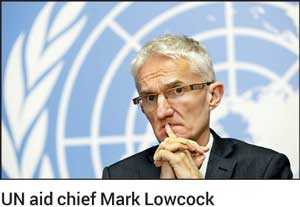Sunday Feb 22, 2026
Sunday Feb 22, 2026
Saturday, 18 July 2020 00:10 - - {{hitsCtrl.values.hits}}
 NEW YORK (Reuters): Coronavirus support to poor countries has been so far “grossly inadequate and that’s dangerously shortsighted,” UN aid chief Mark Lowcock said on Thursday as he asked wealthy countries for billions more dollars in assistance.
NEW YORK (Reuters): Coronavirus support to poor countries has been so far “grossly inadequate and that’s dangerously shortsighted,” UN aid chief Mark Lowcock said on Thursday as he asked wealthy countries for billions more dollars in assistance.
The United Nations increased its humanitarian appeal by more than a third to $ 10.3 billion to help 63 states, mainly in Africa and Latin America, tackle the spread and destabilising effects of the coronavirus. This is up from the world body’s initial $ 2 billion request in March, then $ 6.7 billion in May.
So far, Lowcock said, the United Nations has only received $ 1.7 billion.
As finance ministers from the Group of 20 major economies prepare to meet virtually on Saturday, Lowcock told reporters: “The message to the G20 is step up now or pay the price later.”
The coronavirus has infected at least 13.6 million people and there have been more than 584,000 known deaths worldwide, according to a Reuters tally. The United Nations has warned that if action is not taken, the pandemic and associated global recession will trigger an increase in global poverty for the first time since 1990 and push 265 million people to the brink of starvation.
“The response so far of wealthy nations, who’ve rightly thrown out the fiscal and monetary rule books to protect their own people and economies, the response that they’ve made to the situations in other countries has been grossly inadequate and that’s dangerously shortsighted,” Lowcock said.
Lowcock added he had lobbied US lawmakers for funding earlier this week. A House of Representatives committee has proposed $ 10 billion in international aid. So far, Congress has provided $ 2.4 billion in emergency foreign aid.
In May, China’s President Xi Jinping pledged $ 2 billion to help deal with the coronavirus and economic and social development in affected countries, especially developing states.
Lowcock said he would “very much welcome it if some significant proportion of those resources could be used directly to support the global humanitarian response plan.”